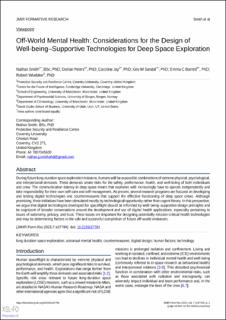| dc.contributor.author | Smith, Nathan A. | |
| dc.contributor.author | Peters, D. | |
| dc.contributor.author | Jay, C. | |
| dc.contributor.author | Sandal, Gro Mjeldheim | |
| dc.contributor.author | Barrett, E.C. | |
| dc.contributor.author | Wuebker, R. | |
| dc.date.accessioned | 2023-04-03T13:22:10Z | |
| dc.date.available | 2023-04-03T13:22:10Z | |
| dc.date.created | 2022-08-22T14:26:29Z | |
| dc.date.issued | 2023 | |
| dc.identifier.issn | 2561-326X | |
| dc.identifier.uri | https://hdl.handle.net/11250/3061871 | |
| dc.description.abstract | During future long-duration space exploration missions, humans will be exposed to combinations of extreme physical, psychological, and interpersonal demands. These demands create risks for the safety, performance, health, and well-being of both individuals and crew. The communication latency in deep space means that explorers will increasingly have to operate independently and take responsibility for their own self-care and self-management. At present, several research programs are focused on developing and testing digital technologies and countermeasures that support the effective functioning of deep space crews. Although promising, these initiatives have been stimulated mostly by technological opportunity rather than cogent theory. In this perspective, we argue that digital technologies developed for spaceflight should be informed by well-being–supportive design principles and be cognizant of broader conversations around the development and use of digital health applications, especially pertaining to issues of autonomy, privacy, and trust. These issues are important for designing potentially mission-critical health technologies and may be determining factors in the safe and successful completion of future off-world endeavors. | en_US |
| dc.language.iso | eng | en_US |
| dc.publisher | JMIR | en_US |
| dc.rights | Navngivelse 4.0 Internasjonal | * |
| dc.rights.uri | http://creativecommons.org/licenses/by/4.0/deed.no | * |
| dc.title | Off-world mental health: considerations for the design of well-being-supportive technologies for deep space exploration | en_US |
| dc.type | Journal article | en_US |
| dc.type | Peer reviewed | en_US |
| dc.description.version | publishedVersion | en_US |
| dc.rights.holder | Copyright 2023 The Author(s) | en_US |
| dc.source.articlenumber | e37784 | en_US |
| cristin.ispublished | true | |
| cristin.fulltext | original | |
| cristin.qualitycode | 1 | |
| dc.identifier.doi | https://doi.org/10.2196/37784 | |
| dc.identifier.cristin | 2044997 | |
| dc.source.journal | JMIR Formative Research | en_US |
| dc.identifier.citation | JMIR Formative Research. 2023, 7, e37784. | en_US |
| dc.source.volume | 7 | en_US |

